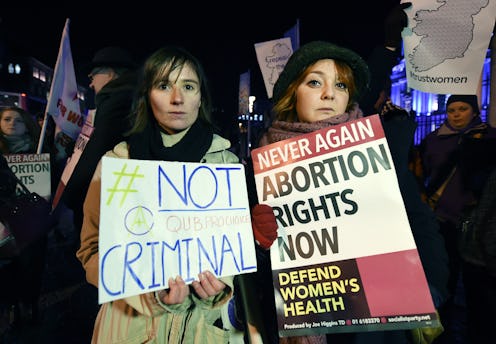News
Irish Women Who Get Abortions Will Keep Being Jailed Unless This Law Is Repealed

In the Republic of Ireland, there is one only rule about abortion: a woman can undergo it only if her life is at risk because of her pregnancy. This stringent rule is enforced by the government under the Eighth Amendment. Introduced to the republic's constitution in 1983 after a referendum, the amendment inspired the 1992 campaign "Repeal The Eight Amendment," which led to Abortion Rights Campaign in 2012. Both campaigns demanded for the same right: safe and accessible abortion services for Irish women. Now, according to government sources, Ireland will hold a referendum on abortion in May or June of 2018, which could significantly impact Irish women's bodily autonomy.
Premier Leo Varadkar's government intends on allowing the polarizing subject to go public so that Irish people may decide if abortion should be allowed to gain legal status "in almost all cases." And past records hint there is some reason for hope. Ireland has shown the capability to move in the progressive direction in instances such the 2015 referendum which led to the legalization of same-sex marriages. For what it's worth, the decision elevated Ireland to the status of the first country in the world to legalize same-sex marriages through a referendum. That's no mean feat.
Currently, however, Ireland's law on abortion culminates in some harrowing situations for women. Here are some facts worth considering:
- A woman in Ireland can face up to 14 years in prison if convicted of an illegal abortion.
- Women can have abortions but only abroad. Many seek England as their primary destination for terminating a pregnancy in often fragile and dangerous conditions.
- Investigative reports about Ireland's Health Products Regulatory Authority (HPRA) indicate that regulators reportedly confiscated abortion pills entering the country. A Broadly report said that almost 3,467 pills had been seized between 2011 and 2015.
- In one particularly disturbing case from 2016, a pregnant minor reportedly seeking abortion was sent to a psychiatric clinic instead.
- Since 2010, nearly 25,000 pregnant women in Ireland have had to travel to terminate their pregnancies.
- Abortion alone can cost an Irish woman between $600 to $2,000. This does not include expenditure brought on by travel and accommodation.
- Adding to the psychological trauma of inaccessible abortion and exorbitant fees, there is also no guarantee whether a woman will be able to travel in peace as anti-abortion campaigners frequently harass women traveling to terminate their pregnancy.
- Raids are frequently carried out at pro-choice activists' homes as well as the homes of women seeking abortions, according to reports. In April, 2016, a desperate woman was arrested for an illegal abortion after her housemates reported to have found fetal remains in the shared kitchen trash can.
In other words, a woman who wishes to assert autonomy over her own body and choices will face an intimidating amount of resistance from legal bodies and medical institutions in the Republic of Ireland.
The international community has issued strong words for Ireland's record on abortion access. In June, a committee from the United Nations termed Ireland's current law as inconsistent with human rights. The report arrived as an evaluation of the shocking 2010 case of Siobhan Whelan who was denied abortion services in spite of being diagnosed with fatal fetal syndrome.
"The human rights committee has found that what happened to me was a human rights violation. It has recognised that Ireland’s abortion laws can cause women intense suffering, violating our most basic human rights," Whelan said.
If the referendum is in favor of changing the Eighth Amendment, thousands of women who have been forced to travel for abortion, denied abortion medicine, sent to psychiatric evaluations instead of hospitals, arrested for seeking desperate measures to terminate their pregnancies, and robbed of their right over their bodies, will have the chance to decide what they wish to do with their bodies and lives. If it passes, abortion will no longer be a criminal offense in the Republic of Ireland.